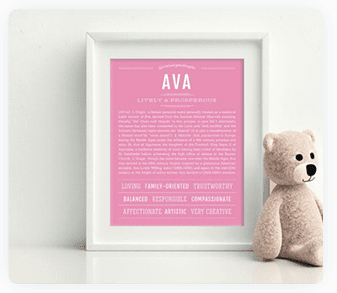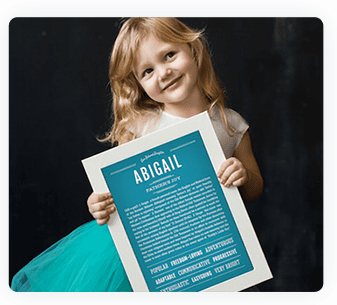Literary Characters
OF THE BABY NAME PRINCESS
Ida is the lady of Alfred, Lord Tennyson’s narrative poem, “The Princess”, published in 1847 (upon which Gilbert and Sullivan’s 1884 comic opera, “Princess Ida” is based). Ida is a beautiful princess who has been betrothed to a neighboring prince since birth. Ida, however, decides that she will establish a university strictly for women, and will forgo the world of men. Her prince doesn’t take this lying down, and along with two friends, all disguised as women, applies to the university. Needless to say, the disguise is not an easy one to uphold and, before long, they are found out. This almost brings about war, backed by the main participants’ fathers, but all is well in the end. Ida is persuaded by her prince, who had been raised by an extremely futuristic mother, that he is all for equality in love and education. That he is several generations ahead of real men does not seem to bother Ida at all, and she happily acquiesces, even tending to the wounds he had sustained in his “battle” with her. Critics still disagree on whether or not the piece is pro or anti feminist. How about you?
Princess Ida is the title character of Arthur Sullivan and W. S. Gilbert’s 1884 comic opera, Princess Ida; or, Castle Adamant, based upon Alfred, Lord Tennyson’s 1847 poem, “The Princess”. Gilbert and Sullivan set the poem to music and lyrics, and applied a healthy swath of satire against such hot Victorian topics as women’s equality and right to education, as well as the theories of Darwin. It was well received, but did not run as long as expected and was not revived in London again until 1919. The play is still performed regularly today, but 21st century audiences are bound to find it rather dated in its treatment of gender roles.
Princess Leia is the famous girl with the bagel braids from George Lucas’ iconic Star Wars series of sci-fi movies beginning in 1977. Any mother would be proud to have her daughter adopt Princess Leia’s character traits. Leia is strong, brave, resourceful and loyal. Oh, and she’s also a crack shot and a warrior woman, all while presenting a lovely and feminine demeanor. Not to mention that metallic bikini.
Once upon a time, princesses were cruelly put upon, deprived of their rightful heritage, married off to the highest bidder, and, when all was said and done, rescued by the Princes and stowed away In the castles forever. This was a “happily forever”, we were told. Well, sistahs, not no more! Those archetypal princesses are the bane of existence for modern feministas, and we are re-writing the book. Bring on your trolls and dragons, your poisoned apples and glass coffins, but be prepared for sword-wielding, karate proficient, no-nonsense women to rise to the bait. Need a dragon slain, a frog kissed, a kingdom rescued, a magic potion dissolved? Look no further than the nearest graduate school, but be prepared to pay a high fee for services rendered. Once personified by Cinderella and Snow White, today’s modern princess is more apt to be found in the likes of Leia and Fiona, strong women who are more comfortable being the rescuer than the rescuee, and who have no problems with bodily functions just like the common folk. This only endears them more to us, and enhances their hold upon our imaginations. Long live The Princess!
Becky is the scullery maid in Frances Hodgson Burnett’s 1905 children’s book, A Little Princess. The title refers to seven year old Sara Crewe, a child at Miss Minchin’s boarding school in London, whose wealthy father dies abroad while she is there, and she is turned from a schoolgirl into a servant, sharing quarters with Becky. Becky proves to be a true friend to Sara, helping her to accept the restrictions of her lowered circumstances. As Sara has never been condescending to the servant girl, so Becky responds in kind. Now that Sara is poor, the only thing that Becky wishes to do for her is to be her servant. In time-honored tradition, Sara’s wealth is restored and having grown older, she takes Becky away with her to a just reward.
Princess Fiona is the kind-hearted and feisty princess in the Shrek film series, and is voiced by Cameron Diaz. (It was also staged as a musical in 2001.) Fiona is under a magic spell that makes her a human by day, but an ogress by night – what a dilemma – especially as it is the ogre, Shrek, who has been commissioned to bring her to her betrothed, Lord Farquaard. Naturally, things heat up between the ogre and the ogress on the way to the lord, and just as naturally, misunderstandings arise. Love saves the day, however, and when Shrek kisses Fiona, she becomes an ogress permanently – and isn’t that just the finest solution you could ever imagine? Among Fiona’s many adventures throughout the series, she manages to give birth to the couple’s triplets – ogrettes? -, named, charmingly, Felicia, Fergus and Farkle. But of course.
Born Amelia, Mia Thermopolis or Princess Mia (Princess of Genovia) is the main character in Meg Cabot’s notable series of novels “The Princess Diaries” first published in 2000. Offbeat Mia will automatically win the heart of every teenage girl who's ever just wanted to fit in with as little fuss as possible. Meg Cabot's writing is silly and entertaining; with tons of pop culture references that will make teens feel right at home within her pages. This is a wonderfully wacky read about an endearing female character coming-of-age.



